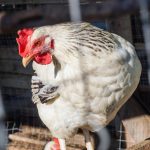Chicken pecking behavior is a prevalent issue in poultry farming that can significantly affect the health and welfare of younger birds. This behavior manifests in various forms, from mild pecking to severe aggression, potentially resulting in injuries, elevated stress levels, and, in extreme instances, mortality. To ensure a safe and healthy environment for young chickens, it is essential to comprehend the underlying causes of pecking behavior and implement effective prevention strategies.
This article examines the consequences of pecking on younger chickens, investigates the factors contributing to this behavior, and presents practical approaches for preventing and managing pecking incidents in poultry farming operations.
Table of Contents
- 1 The Impact of Pecking on Younger Chickens
- 2 Understanding the Reasons Behind Chicken Pecking
- 3 Strategies for Preventing Chicken Pecking
- 4 Creating a Healthy and Safe Environment for Younger Chickens
- 5 The Role of Social Hierarchy in Chicken Pecking
- 6 Conclusion and Recommendations for Managing Chicken Pecking
- 7 FAQs
- 7.1 What is pecking behavior in chickens?
- 7.2 Why do chickens peck younger chickens?
- 7.3 What are the potential consequences of chickens pecking younger chickens?
- 7.4 How can I prevent chickens from pecking younger chickens?
- 7.5 Are there any specific breeds of chickens that are more prone to pecking behavior?
Key Takeaways
- Chicken pecking behavior is a common issue in poultry farming and can have negative impacts on younger chickens.
- Pecking can lead to injuries, stress, and even death in younger chickens, affecting their growth and overall well-being.
- Understanding the reasons behind chicken pecking, such as stress, overcrowding, and nutritional deficiencies, is crucial for prevention and management.
- Implementing strategies like providing adequate space, balanced nutrition, and environmental enrichment can help prevent and reduce chicken pecking.
- Creating a healthy and safe environment, establishing social hierarchy, and closely monitoring chicken behavior are essential for managing and preventing pecking in poultry farming.
The Impact of Pecking on Younger Chickens
Physical Harm and Stress
Aggressive pecking can lead to injuries such as skin wounds, feather loss, and even cannibalism, which can result in serious health issues and even death for the affected chickens. In addition to physical harm, pecking behavior can also cause stress and anxiety in younger chickens, leading to decreased egg production, poor growth rates, and overall reduced welfare.
Furthermore, pecking behavior can create a negative environment within the flock, leading to increased aggression and decreased social interactions among the chickens. It is essential for poultry farmers to recognize the impact of pecking on younger chickens and take proactive measures to prevent and manage this behavior.
Natural Behavior and Effective Strategies
On the other hand, gentle pecking behavior is a natural part of chicken socialization and communication. Chickens use pecking as a way to establish social hierarchy, communicate with each other, and explore their environment. However, when pecking behavior becomes aggressive or excessive, it can lead to serious consequences for the younger chickens in the flock. Understanding the impact of pecking on younger chickens is crucial for implementing effective strategies to prevent and manage this behavior in poultry farming.
Understanding the Reasons Behind Chicken Pecking

There are several reasons behind chicken pecking behavior, including genetic predisposition, environmental factors, social hierarchy, and stress. Genetic predisposition plays a role in determining a chicken’s propensity for aggressive pecking behavior, as some breeds may be more prone to this behavior than others. Environmental factors such as overcrowding, poor ventilation, inadequate nutrition, and lack of environmental enrichment can also contribute to pecking behavior in chickens.
Additionally, social hierarchy within the flock plays a significant role in pecking behavior, as chickens establish a pecking order to determine their rank within the group. Stress is another important factor that can trigger pecking behavior in chickens, as it can lead to increased aggression and reduced social interactions within the flock. It is essential for poultry farmers to understand the reasons behind chicken pecking behavior in order to implement effective strategies for prevention and management.
By addressing genetic predisposition, environmental factors, social hierarchy, and stress, farmers can create a healthier and safer environment for younger chickens and reduce the incidence of pecking behavior within their flocks.
Strategies for Preventing Chicken Pecking
There are several strategies that poultry farmers can implement to prevent and manage chicken pecking behavior in their flocks. One effective strategy is to provide adequate space and environmental enrichment for the chickens, including access to outdoor areas, perches, dust baths, and toys. This can help reduce stress and boredom within the flock, leading to decreased pecking behavior.
Additionally, ensuring proper ventilation, lighting, and nutrition can also help prevent pecking behavior in chickens. Another important strategy is to carefully manage the social dynamics within the flock by introducing new chickens gradually and providing enough resources such as food and water to prevent competition and aggression. It is also crucial to monitor the flock regularly for any signs of aggressive pecking behavior and intervene as needed to prevent injuries and reduce stress among the chickens.
Furthermore, providing distractions such as hanging treats or mirrors can help redirect aggressive pecking behavior and promote positive social interactions within the flock. By implementing these strategies, poultry farmers can create a healthier and more harmonious environment for their chickens, reducing the incidence of pecking behavior and promoting the overall well-being of the flock.
Creating a Healthy and Safe Environment for Younger Chickens
Creating a healthy and safe environment for younger chickens is essential for preventing and managing pecking behavior in poultry farming. This includes providing adequate space, ventilation, lighting, nutrition, and environmental enrichment for the chickens to thrive. Adequate space allows chickens to move freely and reduces competition for resources, while proper ventilation and lighting help maintain a comfortable and stress-free environment within the flock.
Additionally, providing a balanced diet with access to clean water at all times is crucial for promoting good health and reducing stress among the chickens. Environmental enrichment such as perches, dust baths, toys, and hanging treats can help reduce boredom and redirect aggressive pecking behavior in chickens. These enrichments provide opportunities for natural behaviors such as perching, scratching, and foraging, which can help reduce stress and promote positive social interactions within the flock.
By creating a healthy and safe environment for younger chickens, poultry farmers can effectively prevent and manage pecking behavior in their flocks.

The Establishment of a Pecking Order
Social hierarchy plays a significant role in chicken pecking behavior, as chickens establish a pecking order within the flock to determine their rank and access to resources. The establishment of a pecking order is a natural part of chicken socialization and communication, but it can also lead to aggressive pecking behavior if not managed properly.
Dominant chickens may exhibit aggressive pecking towards subordinate chickens to assert their rank within the flock, leading to injuries and stress among the chickens. This can have serious consequences for the health and well-being of the flock if left unchecked.
It is essential for poultry farmers to understand the dynamics of social hierarchy within their flocks and take proactive measures to manage it effectively. This includes providing enough resources such as food, water, and space to prevent competition and aggression among the chickens. Additionally, introducing new chickens gradually and monitoring their interactions with the existing flock can help reduce aggression and establish a harmonious social hierarchy within the flock.
By managing social hierarchy effectively, poultry farmers can reduce the incidence of aggressive pecking behavior and promote positive social interactions among their chickens. This leads to a healthier and more productive flock, which is essential for a successful poultry farming operation.
Conclusion and Recommendations for Managing Chicken Pecking
In conclusion, chicken pecking behavior can have significant impacts on the health and well-being of younger chickens in poultry farming. Understanding the reasons behind this behavior, implementing effective strategies for prevention and management, and creating a healthy and safe environment for younger chickens are crucial for promoting the overall welfare of the flock. By addressing genetic predisposition, environmental factors, social hierarchy, and stress, poultry farmers can reduce the incidence of pecking behavior within their flocks and create a harmonious environment for their chickens.
Recommendations for managing chicken pecking behavior include providing adequate space and environmental enrichment for the chickens, carefully managing social dynamics within the flock, monitoring the flock regularly for signs of aggressive pecking behavior, and intervening as needed to prevent injuries and reduce stress among the chickens. Additionally, creating a healthy and safe environment for younger chickens by ensuring proper ventilation, lighting, nutrition, and access to environmental enrichment is crucial for preventing pecking behavior in poultry farming. By implementing these recommendations, poultry farmers can effectively prevent and manage chicken pecking behavior in their flocks, promoting the overall well-being of their chickens and creating a positive environment for successful poultry farming.
If you’re experiencing issues with older chickens pecking at younger ones, it may be helpful to consider the dynamics of your chicken coop. According to a recent article on PoultryWizard, understanding the behavior of chickens and the importance of providing adequate space and resources can help prevent pecking issues. The article also discusses the benefits of using a SnapLock chicken coop to create a safe and comfortable environment for your flock. Check it out here for more information on how to address pecking behavior in your chicken coop.
FAQs
What is pecking behavior in chickens?
Pecking behavior in chickens refers to the act of one chicken pecking at another, often causing injury or distress. This behavior can be a natural part of the chicken’s social hierarchy, but excessive pecking can lead to serious issues within a flock.
Why do chickens peck younger chickens?
Chickens may peck younger chickens as a way to establish and maintain their social hierarchy within the flock. This behavior can also be a result of stress, overcrowding, or boredom.
What are the potential consequences of chickens pecking younger chickens?
Chickens pecking younger chickens can lead to injuries, stress, and even death within the flock. It can also disrupt the overall harmony and productivity of the flock.
How can I prevent chickens from pecking younger chickens?
To prevent chickens from pecking younger chickens, it is important to provide adequate space, enrichment, and a balanced diet for the flock. Additionally, introducing new chickens to the flock gradually and monitoring their interactions can help prevent excessive pecking behavior.
Are there any specific breeds of chickens that are more prone to pecking behavior?
Certain breeds of chickens may be more prone to pecking behavior, but individual temperament and environmental factors also play a significant role. It is important to monitor the behavior of all chickens within a flock, regardless of breed.
Meet Walter, the feathered-friend fanatic of Florida! Nestled in the sunshine state, Walter struts through life with his feathered companions, clucking his way to happiness. With a coop that’s fancier than a five-star hotel, he’s the Don Juan of the chicken world. When he’s not teaching his hens to do the cha-cha, you’ll find him in a heated debate with his prized rooster, Sir Clucks-a-Lot. Walter’s poultry passion is no yolk; he’s the sunny-side-up guy you never knew you needed in your flock of friends!







